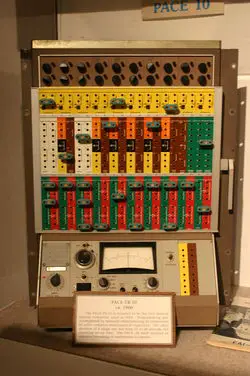From WikiChip
Difference between revisions of "electronic associates/pace tr-10"
m |
m |
||
| Line 23: | Line 23: | ||
}} | }} | ||
}} | }} | ||
| − | The '''PACE TR-10''' was a fully [[transistor computer|transistorized]] general-purpose [[analog computer]] developed by [[Electronic Associates]] in 1959. The TR-10 was the | + | The '''PACE TR-10''' was a fully [[transistor computer|transistorized]] general-purpose [[analog computer]] developed by [[Electronic Associates]] in 1959. This was EAI's first and smallest transistorized analog computer. The TR-10 was also the smallest in the {{eai|PACE}} family, capable of solving tenth-order differential equations. The TR-10 became well known for its flexibility and robustness. |
==Details== | ==Details== | ||
Revision as of 01:42, 20 December 2015
| PACE TR-10 | |

| |
| PACE TR-10 at the National Cryptologic Museum. | |
| Developer | Electronic Associates |
| Manufacturer | Electronic Associates |
| Product family | PACE Series |
| Type | analog computer |
| Release date | 1959[1] |
| Introductory price | $4,000-11,000[1] |
| | |
| Size | 16" wide, 24" height, 15" depth |
| Weight | 95LB |
| | |
| Operating Range | +/-10V |
| Components |
|
The PACE TR-10 was a fully transistorized general-purpose analog computer developed by Electronic Associates in 1959. This was EAI's first and smallest transistorized analog computer. The TR-10 was also the smallest in the PACE family, capable of solving tenth-order differential equations. The TR-10 became well known for its flexibility and robustness.
Details
| This section is empty; you can help add the missing info by editing this page. |
Slave network
| This section is empty; you can help add the missing info by editing this page. |
Museum displays
- TR-10, Analog Museum